| Revision as of 04:31, 13 February 2013 view sourceIIIraute (talk | contribs)5,842 edits Undid revision 537983878 by Yerevanci (talk) why better - please bring to talk page before removing established content← Previous edit | Revision as of 22:46, 18 February 2013 view source Pugilist (talk | contribs)353 editsm iw daTag: Addition of interwiki linkNext edit → | ||
| Line 644: | Line 644: | ||
| ] | ] | ||
| ] | ] | ||
| ] | |||
| ] | ] | ||
| ] | ] | ||
Revision as of 22:46, 18 February 2013
This article is about Germans as ethnic and legal group. For other uses, see Germans (disambiguation). For the population of Germany, see Demographics of Germany. For an analysis on the nationality or German citizenship, see German nationality law. For the term "Germans" as used in a context of antiquity (pre AD 500), see Germanic tribes. For Germans outside of Germany, see Ethnic Germans.Ethnic group
Germans (Template:Lang-de) are the citizens or native-born people of Germany; or people of descent to the ethnic and ethnolinguistic group associated with the German language. This connection may be ethnic, historical or cultural, legal or residential. The English term Germans has historically referred to the German-speaking population of the Holy Roman Empire since the Late Middle Ages. Legally, Germans are citizens of the Federal Republic of Germany.
Of approximately 100 million native speakers of German in the world, about 66–75 million consider themselves Germans. There are an additional 80 million people of German ancestry mainly in the United States, Brazil (almost totally in the country's South Region), Canada, Argentina, France, Russia, Chile, Poland, Australia and Romania (who most likely are not native speakers of German). Thus, the total number of Germans worldwide lies between 66 and 160 million, depending on the criteria applied (native speakers, single-ancestry ethnic Germans, partial German ancestry, etc.).
Today, peoples from countries with a German-speaking majority or significant German-speaking population groups other than Germany, such as Austria, Switzerland, Liechtenstein and Luxembourg, have developed their own national identity, and since the end of World War II, have not referred to themselves as "Germans" in a modern context.
Name
Further information: Names of Germany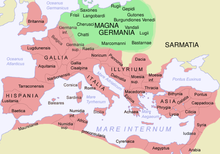
The German term Deutsche originates from the Old High German word diutisc (from diot "people"), referring to the Germanic "language of the people". It is not clear how commonly, if at all, the word was used as an ethnonym in Old High German.
Used as a noun, ein diutscher in the sense of "a German" emerges in Middle High German, attested from the second half of the 12th century.
The Old French term alemans is taken from the name of the Alamanni. It was loaned into Middle English as almains in the early 14th century. The word dutch is attested in English from the 14th century, denoting continental West Germanic ("Dutch" and "German") dialects and their speakers.
While in most the Romance languages the Germans have been named from the Swabians or Alamanni (some, like standard Italian, retain an older borrowing of the endonym), the Old Norse, Finnish and Estonian names of the Germans was taken from that of the Saxons. In Slavic languages, the Germans were given the name of němьci (singular němьcь), originally with a meaning "foreigner, one who does not speak ".
The English term Germans is only attested from the mid-16th century, based on the classical Latin term Germani used by Julius Caesar and later Tacitus. It gradually replaced Dutch and Almains, the latter becoming mostly obsolete by the early 18th century.
History
Main articles: History of Germany, Germanic peoples, and TheodiscusThe Germans are a Germanic people, which as an ethnicity emerged during the Middle Ages. From the multi-ethnic Holy Roman Empire, the Peace of Westphalia (1648) left a core territory that was to become Germany.

The area of modern-day Germany in the European Iron Age was divided into the (Celtic) La Tène horizon in Southern Germany and the (Germanic) Jastorf culture in Northern Germany.
The Germanic peoples during the Migrations Period came into contact with other peoples; in the case of the populations settling in the territory of modern Germany, they encountered Celts to the south, and Balts and Slavs towards the east.
The Limes Germanicus was breached in AD 260. Migrating Germanic tribes commingled with the local Gallo-Roman populations in what is now Swabia and Bavaria. The migration-period peoples who would coalesce into a "German" ethnicity were the Saxons, Franci, Thuringii, Alamanni and Bavarii. By the 800s, the territory of modern Germany had been united under the rule of Charlemagne. Much of what is now Eastern Germany became Slavonic-speaking (Sorbs and Veleti), after these areas were vacated by Germanic tribes (Vandals, Lombards, Burgundians and Suebi amongst others) which had migrated into the former areas of the Roman Empire.
Medieval period
Main articles: Ostsiedlung and History of German settlement in Eastern Europe Further information: Kingdom of Germany, Stem duchy, Medieval demography, and Holy Roman Empire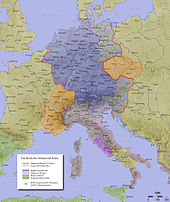
A German ethnicity emerged in the course of the Middle Ages, ultimately as a result of the formation of the kingdom of Germany within East Francia and later the Holy Roman Empire, beginning in the 9th century. The process was gradual and lacked any clear definition, and the use of exonyms designating "the Germans" develops only during the High Middle Ages. The title of rex teutonicum "King of the Germans" is first used in the late 11th century, by the chancery of Pope Gregory VII. Natively, the term ein diutscher "a German" is used of the people of Germany from the 12th century.
After Christianization, the Roman Catholic Church and local rulers led German expansion and settlement in areas inhabited by Slavs and Balts (Ostsiedlung). Massive German settlement led to their assimilation of Baltic (Old Prussians) and Slavic (Wends) populations, who were exhausted by previous warfare. At the same time, naval innovations led to a German domination of trade in the Baltic Sea and parts of Eastern Europe through the Hanseatic League. Along the trade routes, Hanseatic trade stations became centers of German culture. German town law (Stadtrecht) was promoted by the presence of large, relatively wealthy German populations and their influence on political power. Thus people who would be considered "Germans", with a common culture, language, and worldview different from that of the surrounding rural peoples, colonized trading towns as far north of present-day Germany as Bergen (in Norway), Stockholm (in Sweden), and Vyborg (now in Russia). The Hanseatic League was not exclusively German in any ethnic sense: many towns who joined the league were outside the Holy Roman Empire and a number of them may only loosely be characterized as German. The Empire was not entirely German either.
Early Modern period

From the late 15th century, the Holy Roman Empire came to be known as the Holy Roman Empire of the German nation, even though it was not exclusively German, and notably included sizeable Slavic minorities. The Thirty Years' War, a series of conflicts fought mainly in the territory of modern Germany, weakened the coherence of the Holy Roman Empire, leading to the Kleinstaaterei in 18th-century Germany.
The Napoleonic Wars were the cause of the final dissolution of the Holy Roman Empire, and ultimately the cause for the quest for a German nation state in 19th-century German nationalism. After the Congress of Vienna, Austria and Prussia emerged as two competitors. Austria, trying to remain the dominant power in Central Europe, led the way in the terms of the Congress of Vienna. The Congress of Vienna was essentially conservative, assuring that little would change in Europe and preventing Germany from uniting. These terms came to a sudden halt following the Revolutions of 1848 and the Crimean War in 1856, paving the way for German unification in the 1860s.
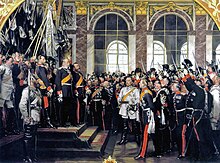
In 1866, the feud between Austria and Prussia finally came to an end. There were several reasons behind this war. As German nationalism grew strongly inside the German Confederation and neither could decide on how Germany was going to be unified into a nation-state. The Austrians favoured the Greater Germany unification but were not willing to give up any of the non-German-speaking land inside of the Austrian Empire and take second place to Prussia. The Prussians however wanted to unify Germany as Little Germany primarily by the Kingdom of Prussia whilst excluding Austria. In the final battle of the German war (Battle of Königgrätz) the Prussians successfully defeated the Austrians and succeeded in creating the North German Confederation.
In 1870, after France attacked Prussia, Prussia and its new allies in Southern Germany (among them Bavaria) were victorious in the Franco-Prussian War. It created the German Empire in 1871 as a German nation-state, effectively excluding the multi-ethnic Austrian Habsburg monarchy and Liechtenstein. Integrating the Austrians nevertheless remained a strong desire for many people of Germany and Austria, especially among the liberals, the social democrats and also the Catholics who were a minority in Germany.
During the 19th century in the German territories, rapid population growth due to lower death rates, combined with poverty, spurred millions of Germans to emigrate, chiefly to the United States. Today, roughly 17% of the United States' population (23% of the white population) is of mainly German ancestry.
Twentieth century
Further information: Volksdeutsche and Reichsdeutsche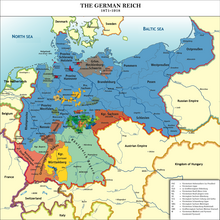

The dissolution of the Austrian-Hungarian Empire after World War I led to a strong desire of the population of the new Republic of German Austria to be integrated into Germany or Switzerland. This was, however, prevented by the Treaty of Versailles.
The Nazis, led by Adolf Hitler, attempted to unite all the people they claimed were "Germans" (Volksdeutsche) into one realm, including ethnic Germans in eastern Europe, many of whom had emigrated more than one hundred fifty years before and developed separate cultures in their new lands. This idea was initially welcomed by many ethnic Germans in Sudetenland, Austria, Poland, Danzig and western Lithuania, particularly the Germans from Klaipeda. The Swiss resisted the idea. They had viewed themselves as a distinctly separate nation since the Peace of Westphalia of 1648.
After World War II, eastern European nations, including areas annexed by the Soviet Union and Poland, expelled Germans from their territories, including Czechoslovakia, Hungary, Romania and Yugoslavia. Between 12 and 16,5 million ethnic Germans and German citizens were expelled westwards to occupied Germany.
After World War II, Austrians increasingly saw themselves as a separate nation from the German nation. Recent polls show that no more than 6% of the German-speaking Austrians consider themselves as "Germans". An Austrian identity was vastly emphasized along with the "first-victim of Nazism theory." Today over 80 percent of the Austrians see themselves as an independent nation.
1945 to present

Between 1950 and 1987, about 1.4 million ethnic Germans and their dependants, mostly from Poland and Romania, arrived in Germany under special provisions of right of return. With the collapse of the Iron Curtain since 1987, 3 million "Aussiedler" – ethnic Germans, mainly from Eastern Europe and the former Soviet Union – took advantage of Germany's law of return to leave the "land of their birth" for Germany.
Approximately 2 million, just from the territories of the former Soviet Union, have resettled in Germany since the late 1980s. On the other hand, significant numbers of ethnic Germans have moved from Germany to other European countries, especially Switzerland, the Netherlands, Britain, Spain and Portugal.
Since 1990 Germany has become home to Europe's third-largest Jewish population. In 2004, twice as many Jews from former Soviet republics settled in Germany as in Israel, bringing the total inflow to more than 200,000 since 1991. Some Jews from the former Soviet Union are of mixed heritage.
In its State of World Population 2006 report, the United Nations Population Fund lists Germany with hosting the third-highest percentage of the main international migrants worldwide, about 5% or 10 million of all 191 million migrants.
Ethnicity
Main article: Ethnic Germans
The German ethnicity is linked to the Germanic tribes of antiquity in central Europe. The early Germans originated on the North German Plain as well as southern Scandinavia. By the 2nd century BC, the number of Germans was significantly increasing and they began expanding into eastern Europe and southward into Celtic territory. During antiquity these Germanic tribes remained separate from each other and did not have writing systems at this time. By 55 BC, the Germans had reached the Danube river and had either assimilated or otherwise driven out the Celts who had lived there, and had spread west into what is now Belgium and France.
Conflict between the Germanic tribes and the forces of Rome under Julius Caesar forced major Germanic tribes to retreat to the east bank of the Rhine. Roman emperor Augustus in 12 BC ordered the conquest of the Germans, but the catastrophic Roman defeat at the Battle of the Teutoburg Forest resulted in the Roman Empire abandoning its plans to completely conquer Germany. Germanic peoples in Roman territory were culturally Romanized, and although much of Germany remained free of direct Roman rule, Rome deeply influenced the development of German society, especially the adoption of Christianity by the Germans who obtained it from the Romans. In Roman-held territories with Germanic populations, the Germanic and Roman peoples intermarried, and Roman, Germanic, and Christian traditions intermingled. The adoption of Christianity would later become a major influence in the development of a common German identity. The first major public figure to speak of a German people in general, was the Roman figure Tacitus in his work Germania around 100 AD. However an actual united German identity and ethnicity did not exist then, and it would take centuries of development of German culture until the concept of a German ethnicity began to become a popular identity.
The arrival of the Huns in Europe resulted in Hun conquest of large parts of Eastern Europe, the Huns initially were allies of the Roman Empire who fought against Germanic tribes, but later the Huns cooperated with the Germanic tribe of the Ostrogoths, and large numbers of Germans lived within the lands of the Hunnic Empire of Attila. Attila had both Hunnic and Germanic families and prominent Germanic chiefs amongst his close entourage in Europe. The Huns living in Germanic territories in Eastern Europe adopted an East Germanic language as their lingua franca. A major part of Attila's army were Germans, during the Huns' campaign against the Roman Empire. After Attila's unexpected death the Hunnic Empire collapsed with the Huns disappearing as a people in Europe – who either escaped into Asia, or otherwise blended in amongst Europeans.
During the wars waged in the Baltic by the Catholic German Teutonic Knights; the lands inhabited by the ethnic group of the Old Prussians (the current reference to the people known then simply as the "Prussians"), were conquered by the Germans. The Old Prussians were an ethnic group related to the Latvian and Lithuanian Baltic peoples. The former German state of Prussia took its name from the Baltic Prussians, although it was led by Germans who had assimilated the Old Prussians; the old Prussian language was extinct by the 17th or early 18th century. The Slavic people of the Teutonic-controlled Baltic were assimilated into German culture and eventually there were many intermarriages of Slavic and German families, including amongst the Prussia's aristocracy known as the Junkers. Prussian military strategist Karl von Clausewitz is a famous German whose surname is of Slavic origin.
By the Middle Ages, large numbers of Jews lived in the Holy Roman Empire and had assimilated into German culture, including many Jews who had previously assimilated into French culture and had spoken a mixed Judeo-French language. Upon assimilating into German culture, the Jewish German peoples incorporated major parts of the German language and elements of other European languages into a mixed language known as Yiddish. However tolerance and assimilation of Jews in German society suddenly ended during the Crusades with many Jews being forcefully expelled from Germany and Western Yiddish disappeared as a language in Germany over the centuries, with German Jewish people fully adopting the German language. By the 1820s, large numbers of Jewish German women had intermarried with Christian German men and had converted to Christianity. Jewish German Eduard Lasker was a prominent German nationalist figure who promoted the unification of Germany in the mid-19th century.
The event of the Protestant Reformation and the politics that ensued has been cited as the origins of German identity that arose in response to the spread of a common German language and literature. Early German national culture was developed through literary and religious figures including Martin Luther, Johann Wolfgang von Goethe and Friedrich Schiller. The concept of a German nation was developed by German philosopher Johann Gottfried Herder. The popularity of German identity arose in the aftermath of the French Revolution.
Persons who speak German as their first language, look German and whose families have lived in Germany for generations are considered "most German", followed by categories of diminishing Germanness such as Aussiedler (people of German ancestry whose families have lived in Eastern Europe but who have returned to Germany), Restdeutsche (people living in lands that have historically belonged to Germany but which is currently outside of Germany), Auswanderer (people whose families have emigrated from Germany and who still speak German), German speakers in German speaking nations such as Austrians, and finally people of German emigrant background who no longer speak German.
Language
Main article: German languageThe native language of Germans is German, a West Germanic language, related to and classified alongside English and Dutch, and sharing many similarities with the North Germanic or Scandinavian languages. Spoken by approximately 100 million native speakers, German is one of the world's major languages and the most widely spoken first language in the European Union.
Dialects
Main article: German dialects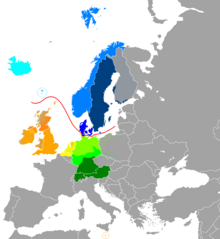
- High German
- Upper German
- Bavarians (ca. 10 million) form the Austro-Bavarian linguistic group, together with those Austrians who speak German and do not live in Vorarlberg and the western Tyrol district of Reutte. Swabians (ca. 10 million) form the Alemannic group, together with the Alemannic Swiss, Liechtensteiners, Alsatians and Vorarlbergians.
- Central German dialect group (ca. 45 million)
- West Central German
- Central Franconian (Ripuarian, Kölsch), forms a dialectal unity with Luxembourgish, Rhine Franconian(Hessian)
- East Central German
- West Central German
- Yiddish, a High German language of Ashkenazi Jewish origin, spoken throughout the world. It developed as a fusion of German dialects with Hebrew, Slavic languages and traces of Romance languages.
- Upper German
- Low German (ca. 3–10 million), forms a dialectal unity with Dutch Low Saxon
Native speakers
Global distribution of native speakers of the German language:
| Country | German speaking population (outside Europe) |
|---|---|
| USA | 5,000,000 |
| Brazil | 3,000,000 |
| Russia | 2,000,000 |
| Poland | 800,000 |
| Argentina | 500,000 |
| Canada | 450,000 – 620,000 |
| Italy | 250,000 |
| Hungary | 220,000 |
| Chile | 150,000-200,000 |
| Australia | 110,000 |
| South Africa | 75,000 (German expatriate citizens) |
| Belgium | 66,000 |
| Paraguay | 56,000 |
| Mexico | 40,000 |
| Namibia | 30,000 (German expatriate citizens) |
| Bolivia | 25,000 |
| Denmark | 20,000 |
| Romania | 15,000 |
| Venezuela | 10,000 |
Geographic distribution

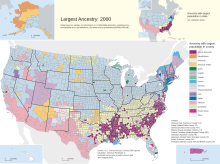
Ethnic Germans form an important minority group in several countries in central and eastern Europe—(Poland, Hungary, Romania, Russia) as well as in Namibia (German Namibian), Brazil (German-Brazilian) (approx. 3% of the population), Argentina (German-Argentine) (~ 7,5% of the population) and Chile (German-Chilean) (approx. 3,1% of the population).
Some groups may be classified as Ethnic Germans despite no longer having German as their mother tongue or belonging to a distinct German culture. Until the 1990s, two million Ethnic Germans lived throughout the former Soviet Union, particularly in Russia and Kazakhstan.
In the United States 1990 census, 57 million people were fully or partly of German ancestry, forming the largest single ethnic group in the country. States with the highest percentage of Americans of German descent are in the northern Midwest (especially Wisconsin, Minnesota, North Dakota, South Dakota, Nebraska, Iowa, Kansas, Michigan) and the Mid-Atlantic state, Pennsylvania. But Germanic immigrant enclaves existed in many other states (e.g., the German Texans and the Denver, Colorado area) and to a lesser extent, the Pacific Northwest (i.e. Idaho, Montana, Oregon and Washington state).
Notable Ethnic German minorities also exist in other Anglosphere countries such as Canada (approx. 10% of the population) and Australia (approx. 4% of the population). As in the United States, most people of German descent in Canada and Australia have almost completely assimilated, culturally and linguistically, into the English-speaking mainstream.
Distribution of German citizens and people claiming German ancestry (figures are only estimates and actual population could be higher, because of wrongly formulated questions in censuses in various countries (for example in Poland) and other different factors, f.e. related to participant in a census):
Culture
Main article: Culture of GermanyLiterature
Main article: German literature
German literature can be traced back to the Middle Ages, with the most notable authors of the period being Walther von der Vogelweide and Wolfram von Eschenbach. The Nibelungenlied, whose author remains unknown, is also an important work of the epoch, as is the Thidrekssaga. The fairy tales collections collected and published by Jacob and Wilhelm Grimm in the 19th century became famous throughout the world.
Theologian Luther, who translated the Bible into German, is widely credited for having set the basis for the modern "High German" language. Among the most admired German poets and authors are Lessing, Goethe, Schiller, Kleist, Hoffmann, Brecht, Heine and Schmidt. Nine Germans have won the Nobel Prize in literature: Theodor Mommsen, Paul von Heyse, Gerhart Hauptmann, Thomas Mann, Nelly Sachs, Hermann Hesse, Heinrich Böll, Günter Grass, and Herta Müller.
Philosophy
Main article: German philosophyGermany's influence on philosophy is historically significant and many notable German philosophers have helped shape Western philosophy since the Middle Ages. The rise of the modern natural sciences and the related decline of religion raised a series of questions, which recur throughout German philosophy, concerning the relationships between knowledge and faith, reason and emotion, and scientific, ethical, and artistic ways of seeing the world.
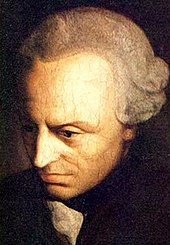
German philosophers have helped shape western philosophy from as early as the Middle Ages (Albertus Magnus). Later, Leibniz (17th century) and most importantly Kant played central roles in the history of philosophy. Kantianism inspired the work of Schopenhauer and Nietzsche as well as German idealism defended by Fichte and Hegel. Marx and Engels developed communist theory in the second half of the 19th century while Heidegger and Gadamer pursued the tradition of German philosophy in the 20th century. A number of German intellectuals were also influential in sociology, most notably Adorno, Habermas, Horkheimer, Luhmann, Simmel, Tönnies, and Weber. The University of Berlin founded in 1810 by linguist and philosopher Wilhelm von Humboldt served as an influential model for a number of modern western universities.
In the 21st century Germany has been an important country for the development of contemporary analytic philosophy in continental Europe, along with France, Austria, Switzerland and the Scandinavian countries.
Science
Main articles: Science and technology in Germany and German inventors and discoverers
Germany has been the home of many famous inventors and engineers, such as Johannes Gutenberg, who is credited with the invention of movable type printing in Europe; Hans Geiger, the creator of the Geiger counter; and Konrad Zuse, who built the first electronic computer. German inventors, engineers and industrialists such as Zeppelin, Daimler, Diesel, Otto, Wankel, Von Braun and Benz helped shape modern automotive and air transportation technology including the beginnings of space travel.
The work of David Hilbert and Max Planck was crucial to the foundation of modern physics, which Werner Heisenberg and Erwin Schrödinger developed further. They were preceded by such key physicists as Hermann von Helmholtz, Joseph von Fraunhofer, and Gabriel Daniel Fahrenheit, among others. Wilhelm Conrad Röntgen discovered X-rays, an accomplishment that made him the first winner of the Nobel Prize in Physics in 1901. The Walhalla temple for "laudable and distinguished Germans", features a number of scientists, and is located east of Regensburg, in Bavaria.
-
 A statue commemorating Johannes Gutenberg for his invention of the first movable type; printing press.
A statue commemorating Johannes Gutenberg for his invention of the first movable type; printing press.
-
 The magnificent panorama of the metal interlinking in the bowels of the worlds first computer created by Konrad Zuse.
The magnificent panorama of the metal interlinking in the bowels of the worlds first computer created by Konrad Zuse.
-
 The Geiger counter, invented by Hans Geiger, is a type of particle detector that measures ionizing radiation.
The Geiger counter, invented by Hans Geiger, is a type of particle detector that measures ionizing radiation.
-
 A print of one of the first X-rays by Wilhelm Röntgen (1845–1923) of the left hand of his wife Anna Bertha Ludwig. It was presented to Professor Ludwig Zehnder of the Physik Institut, University of Freiburg, on 1 January 1896.
A print of one of the first X-rays by Wilhelm Röntgen (1845–1923) of the left hand of his wife Anna Bertha Ludwig. It was presented to Professor Ludwig Zehnder of the Physik Institut, University of Freiburg, on 1 January 1896.
-
 Daniel Gabriel Fahrenheit was a physicist, engineer, and glass blower who is best known for inventing the mercury thermometer (1714), and for developing a temperature scale now named after him.
Daniel Gabriel Fahrenheit was a physicist, engineer, and glass blower who is best known for inventing the mercury thermometer (1714), and for developing a temperature scale now named after him.
Music
Main article: Music of Germany
In the field of music, Germany claims some of the most renowned classical composers of the world including Bach, Mozart and Beethoven, who marked the transition between the Classical and Romantic eras in Western classical music. Other composers of the Austro-German tradition who achieved international fame include Brahms, Wagner, Haydn, Schubert, Händel, Schumann, Liszt, Mendelssohn Bartholdy, Johann Strauss II, Bruckner, Mahler, Telemann, Richard Strauss, Schoenberg, Orff, and most recently, Henze, Lachenmann, and Stockhausen.
As of 2008, Germany is the fourth largest music market in the world and has exerted a strong influence on Dance and Rock music, and pioneered trance music. Artists such as Herbert Grönemeyer, Scorpions, Rammstein, Nena, Dieter Bohlen, Tokio Hotel and Modern Talking have enjoyed international fame. German musicians and, particularly, the pioneering bands Tangerine Dream and Kraftwerk have also contributed to the development of electronic music. Germany hosts many large rock music festivals annually. The Rock am Ring festival is the largest music festival in Germany, and among the largest in the world. German artists also make up a large percentage of Industrial music acts, which is called Neue Deutsche Härte. Germany hosts some of the largest Goth scenes and festivals in the entire world, with events like Wave-Gothic-Treffen and M'era Luna Festival easily attracting up to 30,000 people. Amongst Germany's famous artists there are various Dutch entertainers, such as Johannes Heesters.
Cinema
Main article: Cinema of Germany
German cinema dates back to the very early years of the medium with the work of Max Skladanowsky. It was particularly influential during the years of the Weimar Republic with German expressionists such as Robert Wiene and Friedrich Wilhelm Murnau. The Nazi era produced mostly propaganda films although the work of Leni Riefenstahl still introduced new aesthetics in film. From the 1960s, New German Cinema directors such as Volker Schlöndorff, Werner Herzog, Wim Wenders, Rainer Werner Fassbinder placed West-German cinema back onto the international stage with their often provocative films, while the Deutsche Film-Aktiengesellschaft controlled film production in the GDR.
More recently, films such as Das Boot (1981), The Never Ending Story (1984) Run Lola Run (1998), Das Experiment (2001), Good Bye Lenin! (2003), Gegen die Wand (Head-on) (2004) and Der Untergang (Downfall) (2004) have enjoyed international success. In 2002 the Academy Award for Best Foreign Language Film went to Caroline Link's Nowhere in Africa, in 2007 to Florian Henckel von Donnersmarck's The Lives of Others. The Berlin Film Festival, held yearly since 1951, is one of the world's foremost film and cinemas festivals.
Architecture
Main article: German architecture
Architectural contributions from Germany include the Carolingian and Ottonian styles, important precursors of Romanesque. The region then produced significant works in styles such as the Gothic, Renaissance and Baroque.
The nation was particularly important in the early modern movement through the Deutscher Werkbund and the Bauhaus movement identified with Walter Gropius. The Nazis closed these movements and favoured a type of neo-classicism. Since World War II, further important modern and post-modern structures have been built, particularly since the reunification of Berlin.
Religion


64.1 percent of the German population belongs to Christian denominations. 31.4 percent are Roman Catholic, and 32.7 percent are affiliated with Protestantism (the figures are known accurately because Germany imposes a church tax on those who disclose a religious affiliation / but there are many people, who are religious but not registered). The North and East is predominantly Protestant, the South and West rather Catholic. Nowadays there is a non-religious majority in Hamburg and the East German states.
Germany formed a substantial part of the Roman Catholic Holy Roman Empire, but was also the source of Protestant reformers such as Martin Luther. Historically, Germany had a substantial Jewish minority. Only a few thousand people of Jewish origin remained in Germany after the Holocaust, but the German Jewish community now has approximately 100,000 members, many from the former Soviet Union. Germany also has a substantial Muslim minority, most of whom are from Turkey.
German theologians include Luther, Melanchthon, Schleiermacher, Feuerbach, and Rudolf Otto. Also Germany brought up many mystics including Meister Eckhart, Rudolf Steiner, Jakob Boehme, and some popes (e.g. Benedict XVI).
Sport
Main article: Sport in Germany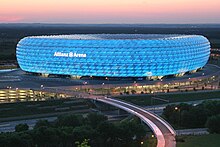
Sport forms an integral part of German life, as demonstrated by the fact that 27 million Germans are members of a sports club and an additional twelve million pursue such an activity individually. Football is by far the most popular sport, and the German Football Federation (Deutscher Fußballbund) with more than 6.3 million members is the largest athletic organisation in the country. It also attracts the greatest audience, with hundreds of thousands of spectators attending Bundesliga matches and millions more watching on television.
Other popular sports include handball, volleyball, basketball, ice hockey, and Winter sports. Historically, German sportsmen have been successful contenders in the Olympic Games, ranking third in an all-time Olympic Games medal count, combining East and West German medals. In the 2012 Summer Olympics, Germany finished sixth overall, whereas in the 2010 Winter Olympics Germany finished second.
Society
Main article: List of Germans
Germany is a modern, advanced society, shaped by a plurality of lifestyles and regional identities. The country has established a high level of gender equality, promotes disability rights, and is legally and socially tolerant towards homosexuals. Gays and lesbians can legally adopt their partner's biological children, and civil unions have been permitted since 2001. The Foreign minister Guido Westerwelle and the mayor of Berlin, Klaus Wowereit, are openly gay.
During the last decade of the 20th century, Germany changed its attitude towards immigrants. Until the mid-1990s the opinion was widespread that Germany is not a country of immigration, even though about 20% of the population were of non-German origin. Today the government and a majority of the German society are acknowledging that immigrants from diverse ethnocultural backgrounds are part of the German society and that controlled immigration should be initiated based on qualification standards.
Since the 2006 FIFA World Cup, the internal and external evaluation of Germany's national image has changed. In the annual Nation Brands Index global survey, Germany became significantly and repeatedly more highly ranked after the tournament. People in 20 different states assessed the country's reputation in terms of culture, politics, exports, its people and its attractiveness to tourists, immigrants and investments. Germany has been named the world's second most valued nation among 50 countries in 2010. Another global opinion poll, for the BBC, revealed that Germany is recognised for the most positive influence in the world in 2010. A majority of 59% have a positive view of the country, while 14% have a negative view.
With an expenditure of €67 billion on international travel in 2008, Germans spent more money on travel than any other country. The most visited destinations were Spain, Italy and Austria.
Identity
Further information: Pan-Germanism and German question
Pan-Germanism's origins began in the early 19th century following the Napoleonic Wars. The wars launched a new movement that was born in France itself during the French Revolution. Nationalism during the 19th century threatened the old aristocratic regimes. Many ethnic groups of Central and Eastern Europe had been divided for centuries, ruled over by the old Monarchies of the Romanovs and the Habsburgs. Germans, for the most part, had been a loose and disunited people since the Reformation when the Holy Roman Empire was shattered into a patchwork of states. The new German nationalists, mostly young reformers such as Johann Tillmann of East Prussia, sought to unite all the German-speaking and ethnic-German (Volksdeutsche) people.
1871–1918
Further information: Unification of Germany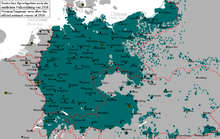
By the 1860s the Kingdom of Prussia and the Austrian Empire were the two most powerful nations dominated by German-speaking elites. Both sought to expand their influence and territory. The Austrian Empire – like the Holy Roman Empire – was a multi-ethnic state, but German-speaking people there did not have an absolute numerical majority; the creation of the Austro-Hungarian Empire was one result of the growing nationalism of other ethnicities especially the Hungarians. Prussia under Otto von Bismarck would ride on the coat-tails of nationalism to unite all of modern-day Germany. The German Empire ("Second Reich") was created in 1871 following the proclamation of Wilhelm I as head of a union of German-speaking states, while disregarding millions of its non-German subjects who desired self-determination from German rule.
There was also a rejection of Roman Catholicism with the Away from Rome! movement calling for German speakers to identify with Lutheran or Old Catholic churches.
1918–1945
Further information: Weimar Republic and Third ReichFollowing the defeat in World War I, influence of German-speaking elites over Central and Eastern Europe was greatly limited. At the treaty of Versailles Germany was substantially reduced in size. Austria-Hungary was split up. Rump-Austria, which to a certain extent corresponded to the German-speaking areas of Austria-Hungary (a complete split into language groups was impossible due to multi-lingual areas and language-exclaves) adopted the name "German-Austria" (Template:Lang-de). The name German-Austria was forbidden by the victorious powers of World War I. Volga Germans living in the Soviet Union were interned in gulags or forcibly relocated during the second world war.
The Heim ins Reich initiative (German: literally Home into the Empire, meaning Back to Reich, see Reich) was a policy pursued by Nazi Germany which attempted to convince people of German descent living outside of Germany (such as Sudetenland) that they should strive to bring these regions "home" into a greater Germany.
1945–1990
Further information: German exodus from Central and Eastern Europe and Flight and expulsion of Germans (1944–1950)
World War II brought about the decline of Pan-Germanism, much as World War I had led to the demise of Pan-Slavism. The Germans in Central and Eastern Europe were expelled, parts of Germany itself were devastated, and the country was divided, firstly into Russian, French, American, and British zones and then into West Germany and East Germany.
Germany suffered even larger territorial losses than it did in the First World War, with huge portions of eastern Germany directly annexed by the Soviet Union and Poland. The scale of the Germans' defeat was unprecedented. Nationalism and Pan-Germanism became almost taboo because they had been used so destructively by the Nazis. Indeed, the word "Volksdeutscher" in reference to ethnic Germans naturalized during WWII later developed into a mild epithet.
1990–present
Further information: German reunificationHowever, German reunification in 1990 revived the old debates. The fear of nationalistic misuse of Pan-Germanism nevertheless remains strong. But the overwhelming majority of Germans today are not chauvinistic in nationalism, but in 2006 and again in 2010, the German National Football Team won third place in the 2006 and 2010 FIFA World Cups, ignited a positive scene of German pride, in fanfare when it comes to sport.

For decades after the Second World War, any national symbol or expression was a taboo. However, the Germans are becoming increasingly patriotic. A study in 2009, in which some 2,000 German citizens age 14 and upwards filled out a questionnaire. Nearly 60% of those surveyed shared the sentiment “I’m proud to be German.” And 78%, if free to choose their nation, would opt for German nationality with “near or absolute certainty”. Another study in 2009, carried out by the Identity Foundation in Düsseldorf, showed that 73% of the Germans were proud of their country, twice more than 8 years earlier. According to Eugen Buss, a sociology professor at the University of Hohenheim, there's an ongoing normalisation and more and more Germans are becoming openly proud of their country.
In the midst of the European sovereign-debt crisis, Radek Sikorski, Poland’s Foreign Minister, stated in November 2011, “I will probably be the first Polish foreign minister in history to say so, but here it is: I fear German power less than I am beginning to fear German inactivity. You have become Europe’s indispensable nation.” According to Jacob Heilbrunn, a senior editor at The National Interest, such a statement is unprecedented when taking into consideration Germany’s history. “This was an extraordinary statement from a top official of a nation that was ravaged by Germany during World War II. And it reflects a profound shift taking place throughout Germany and Europe about Berlin’s position at the center of the Continent.” Heilbrunn believes that the adage, “what was good for Germany was bad for the European Union” has been supplanted by a new mentality—what is in the interest of Germany is also in the interest of its neighbors. The evolution in Germany’s national identity stems from focusing less on its Nazi past and more on its Prussian history, which many Germans believe was betrayed—and not represented—by Nazism. The evolution is further precipitated by Germany’s conspicuous position as Europe’s strongest economy. Indeed, this “German sphere of influence has been welcomed by the countries that inhabit it, as demonstrated by Polish foreign minister Radek Sikorski’s effusive praise for his country’s western neighbor. This shift in thinking is also aided by a newer generation of Germans who are over the mantles of power and see World War II as a distant memory.
See also
- Die Deutschen (ZDF's documentary television series)
- German eastward expansion
- Names for the German language
- Organised persecution of ethnic Germans
- List of Alsatians and Lorrainians
- List of Austrians
- List of ancient Germanic peoples
- List of Swiss people
- List of terms used for Germans
- Ethnic groups in Europe
- Genetic history of Europe
- Anti-German sentiment
| German people | |||||||||||||||||||||||
|---|---|---|---|---|---|---|---|---|---|---|---|---|---|---|---|---|---|---|---|---|---|---|---|
| Historical |
| ||||||||||||||||||||||
| Diaspora |
| ||||||||||||||||||||||
| See also | |||||||||||||||||||||||
References
- Germans and foreigners with an immigrant background. 156 is the estimate which counts all people claiming ethnic German ancestry in the U.S., Brazil, Argentina, and elsewhere.
- "Ethnic Groups of Europe: An Encyclopedia" by Jeffrey Cole (2011), page 171.
- "Report on German population". Histclo.com. 4 February 2010. Retrieved 7 January 2013.
- "Detailed estimates" (PDF). p. 64. Retrieved 7 January 2013.
- "Slightly higher proportion of people with a migration background" (in Template:De icon). Destatis.de. 26 January 2010. Retrieved 7 January 2013.
{{cite web}}: CS1 maint: unrecognized language (link) - "Press releases – For the first time more than 16 million people with migration background in Germany". Federal Statistical Office (Destatis). 14 July 2010. Retrieved 7 January 2013.
- "Pressemitteilungen – Ein Fünftel der Bevölkerung in Deutschland hatte 2010 einen Migrationshintergrund – Statistisches Bundesamt (Destatis)" (in Template:De icon). Destatis.de. 26 September 2011. Retrieved 7 January 2013.
{{cite web}}: CS1 maint: unrecognized language (link) - ^ 66.42 million is the number of Germans without immigrant background, 75 million is the number of German citizens Germans and foreigners with an immigrant background
- "Deutsche Welle: 2005 German Census figures". Dw-world.de. Retrieved 28 September 2011.
- ^ http://hpgl.stanford.edu/publications/EJHG_2002_v10_521-529.pdf
- Joyce Marie Mushaben (1 August 2008). The Changing Faces of Citizenship: Integration and Mobilization Among Ethnic Minorities in Germany. Berghahn Books. pp. 32–35. ISBN 978-1-84545-453-1.
- alongside the slightly earlier term Almayns; John of Trevisa's 1387 translation of Ranulf Higdon's Polychronicon has: Þe empere passede from þe Grees to þe Frenschemen and to þe Germans, þat beeþ Almayns. During the 15th and 16th centuries, Dutch was the adjective used in the sense "pertaining to Germans". Use of German as an adjective dates to ca. 1550. The adjective Dutch narrowed its sense to "of the Netherlands" during the 17th century.
- Donald P. Kommers; Russell A. Miller (9 November 2012). The Constitutional Jurisprudence of the Federal Republic of Germany: Third edition, Revised and Expanded. Duke University Press. p. 267. ISBN 978-0-8223-5266-2.
- Template:Es Hablantes del alemán en el mundo
- e.g. Walther von der Vogelweide. See Lexer, Mittelhochdeutsches Handwörterbuch (1872–1878), s.v. "Diutsche". The Middle High German Song of Roland (ca. 1170) has in diutisker erde (65.6) for "in the German realm, in Germany". The phrase in tütschem land, whence the modern Deutschland, is attested in the late 15th century (e.g. Johann Geiler von Kaysersberg, Ship of Fools, see Grimm, Deutsches Wörterbuch, s.v. "Deutsch").
- OED, s.v. "Dutch, adj., n., and adv."
- Schulze, Hagen (1998). Germany: A New History. Harvard University Press. p. 4. ISBN 0-674-80688-3.
- "German", The Concise Oxford Dictionary of English Etymology. Ed. T. F. Hoad. Oxford: Oxford University Press, 1996. Oxford Reference Online. Oxford University Press. Retrieved 4 March 2008.
- "Austria-Hungary Prussia War 1866". Onwar.com. 16 December 2000. Retrieved 2 August 2012.
- "US Census Factfinder".
- Ihre Meinung. "Als Vorarlberg Schweizer Kanton werden wollte – Vorarlberg – Aktuelle Nachrichten – Vorarlberg Online". Vol.at. Retrieved 28 September 2011.
- "The Nazi Concept of 'Volksdeutsche' and the Exacerbation of Anti-Semitism in Eastern Europe, 1939–45". DeepDyve. 1 January 1994. Retrieved 2 August 2012.
- Willian L. Shirer (1984). Twentieth Century Journey, Volume 2, The Nightmare Years: 1930–1940. Boston, U.S.A.: Little, Brown & Company. ISBN 0-316-78703-5 (v. 2).
- . Development of the Austrian identity
- Peter Utgaard, Remembering and Forgetting Nazism, (New York: Berghahn Books, 2003), 188–189. Frederick C. Engelmann, "The Austro-German Relationship: One Language, One and One-Half Histories, Two States", Unequal Partners, ed. Harald von Riekhoff and Hanspeter Neuhold (San Francisco: Westview Press, 1993), 53–54.
- Redaktion (13 March 2008). "Österreicher fühlen sich heute als Nation – 1938 – derStandard.at " Wissenschaft". Derstandard.at. Retrieved 28 September 2011.
- "Fewer Ethnic Germans Immigrating to Ancestral Homeland". Migrationinformation.org. Retrieved 28 September 2011.
- "External causes of death in a cohort of Aussiedler from the former Soviet Union, 1990–2002". Egms.de. Retrieved 28 September 2011.
- United Nations Population Fund: State of World Population 2006
- ^ World and Its Peoples. Marshall Cavendish, 2009. Pp. 311.
- ^ Yehuda Cohen. The Germans: Absent Nationality and the Holocaust. SUSSEX ACADEMIC PRESS, 2010. Pp. 27.
- ^ World and Its Peoples. Marshall Cavendish, 2009. Pp. 311–312.
- Marvin Perry, Myrna Chase, Margaret Jacob, James R. Jacob, Theodore H. Von Laue. Western Civilization: Ideas, Politics, and Society, Volume I: To 1789. Boston, Massachusetts, USA: Houghton Mifflin Harcourt Publishing Company, 2009. Pp. 212.
- ^ Jeffrey E. Cole. Ethnic Groups of Europe: An Encyclopedia. Santa Barbara, California, USA: ABC-CLIO, 2011. Pp. 172.
- ^ Motyl 2001, pp. 189.
- ^ A History of the Ostrogoths. Pp. 46.
- Sinor, Denis. 1990. The Hun period. In D. Sinor, ed., The Cambridge History of Early Inner Asia. Cambridge University Press. pp. 177–205.
- Jane Penrose. Rome and Her Enemies: An Empire Created and Destroyed by War The Germans and the Romans. Cambridge, England, UK: Osprey Publishing, 2008. Pp. 288.
- Brian A. Pavlac. A Concise Survey of Western Civilization: Supremacies and Diversities Throughout History. Rowman & Littlefield, 2010. Pp. 102.
- Ulrich Ammon, Norbert Dittmar, Klaus J. Mattheier. Soziolinguistik: Ein Internationales Handbuch Zur Wissenschaft Von Sprache und Gesellschaft. English translation edition. Walter de Gruyter, 2006. Pp. 1866.
- Encyclopædia Britannica entry 'Old Prussian language'
- ^ G. J. Meyer. A World Undone: The Story of the Great War 1914 to 1918. Random House Digital, Inc., 2007. Pp. 179.
- ^ Ulrich Ammon, Norbert Dittmar, Klaus J. Mattheier. Soziolinguistik: Ein Internationales Handbuch Zur Wissenschaft Von Sprache und Gesellschaft. English translation edition. Walter de Gruyter, 2006. Pp. 1925.
- Deborah Sadie Hertz. How Jews Became Germans: The History of Conversion and Assimilation in Berlin. Yale University, 2007. Pp. 193.
- James F. Harris. A Study in the Theory and Practice of German Liberalism: Eduard Lasker, 1829–1884. University Press of America, 1984. Pp. 17.
- Kesselman 2009, pp. 180.
- Motyl 2001, pp. 189–190.
- Forsythe, Diana. 1989. German identity and the problem of history. History and ethnicity, p.146
- "Most Widely Spoken Languages". .ignatius.edu. 28 May 2011. Retrieved 28 September 2011.
- "Ethnologue: East Middle German". Retrieved 6 March 2011.
- Introduction to Old Yiddish literature, p. 72, Baumgarten and Frakes, Oxford University Press, 2005
- "Development of Yiddish over the ages", www.jewishgen.org
- ^ Handwörterbuch des politischen Systems der Bundesrepublik (in German). Source lists "German expatriate citizens" only for Namibia and South Africa!
- "Statistics Canada 2006". 2.statcan.ca. 6 January 2010. Retrieved 15 March 2010.
- "Hablantes del alemán en el mundo" (PDF). Retrieved 7 May 2012.
- ^ "Composición Étnica de las Tres Áreas Culturales del Continente Americano al Comienzo del Siglo XXI" (PDF) (in Spanish). p. 188. Retrieved 12 June 2012.
{{cite web}}: CS1 maint: unrecognized language (link) - "The Mennonite Old Colony Vision: Under siege in Mexico and the Canadian Connection" (PDF). Retrieved 30 May 2007.
- "Bolivian Reforms Raise Anxiety on Mennonite Frontier". Nytimes.com. 21 December 2006. Retrieved 7 January 2013.
- "Los Menonitas en Bolivia". Mexico.cnn.com. 7 June 2012. Retrieved 7 January 2013.
- "A Imigração Alemã| Brasil | 14.01.2010". Passeiweb.com. 6 January 1990. Retrieved 28 September 2011.
- German-Argentine Descendants of Germans in Argentina
- ^ "Alemanes en Chile: entre el pasado colono y el presente empresarial | Sociedad |". DW.DE. 31 March 2011. Retrieved 7 January 2013.
- "Number of Germans in Silesia (difficulties with the latest census)" (in Polish). Lubczasopismo.salon24.pl. Retrieved 7 January 2013.
- 49.2 million German Americans as of 2005 according to the "US demographic census". Retrieved 2 August 2007.
{{cite web}}: Unknown parameter|coauthors=ignored (|author=suggested) (help); see also Languages in the United States#German. - "A Imigração Alemã no Brasil | 25.07.2004". Passeiweb.com. 6 January 1990. Retrieved 28 September 2011.
- 2001 Canadian Census gives 2,742,765 total respondents stating their ethnic origin as partly German, with 705,600 stating "single-ancestry", see List of Canadians by ethnicity.
- Including Volga Germans, Swiss Germans, Mennonites, and other German ancestries Centro Argentino Cultural Wolgadeutsche
- ^ "Internet Archive Wayback Machine". Web.archive.org. 13 February 2010. Archived from the original on 13 February 2010. Retrieved 2 August 2012.
{{cite web}}: Cite uses generic title (help) - "Obsevatorio de Colectividades – Comunidad Alemana". Buenosaires.gob.ar. Retrieved 28 September 2011.
- "Germans in South Africa". Webcitation.org. Retrieved 28 September 2011.
- Professor JA Heese in his book Die Herkoms van die Afrikaner (The Origins of Afrikaners) claims the modern Afrikaners (who total around 3.5 million) have 34.4% German heritage. How 'Pure' was the Average Afrikaner?
- "597,212 in Russia as of 2002, 0.4 of Russian population". Perepis2002.ru. Retrieved 7 January 2013.
- Vladimir Geroimenko. "France". Ling.gu.se. Retrieved 28 September 2011.
- "Alsatians". Everyculture.com. 16 January 2010. Retrieved 28 September 2011.
- The Template:PDFlink reports 742,212 people of German ancestry in the 2001 Census. German is spoken by ca. 135,000 , about 105,000 of them Germany-born, see Demographics of Australia
- http://demo.istat.it/str2006/query.php?lingua=ita&Rip=S0&paese=A11&submit=Tavola
- South Tyrol in figures. Provincial Statistics Institute.
- 378,947 (2010, 2.3% of Dutch population). cbs.nl
- German born only; Born Abroad: An Immigration map of Britain: Germany, 2001
- This figure includes children born to British Military personnel serving on British Military bases in Germany
- 2008, 0.15% of UK population. statistics.gov.uk
- "INE(2006)". INE. Retrieved 28 September 2011.
- 265,944 (2009, 3.3% of Swiss population) Wohnbevölkerung nach detaillierter Staatsangehörigkeit, Swiss Federal Statistical Office. 163 923 resident aliens (nationals or citizens) in 2004 (2.2% of total population), compared to 112 348 as of 2000. 2005 report of the Swiss Federal Office of Statistics. 4.6 million including Alemannic Swiss: CIA World Fact Book, identifies the 65% (4.9 million) Swiss German speakers as "ethnic Germans".
- 2002 census
- Template:Es / Inmigración Alemana al Perú
- census 2001
- 2008, 1.5% of Austrian population. Wer sind die Deutschen in Österreich?
- "Money overcomes ideology as Israelis hunt down German passports| Yediot Ahronot | 31.05.2011". Ynetnews. 20 June 1995. Retrieved 28 September 2011.
- "German minority" (in Template:De icon). Auswaertiges-amt.de. Retrieved 28 September 2011.
{{cite web}}: CS1 maint: unrecognized language (link) - "There are 6,000 Germans living in Uruguay today and 40,000 descendants of Germans" (in Template:De icon). Auswaertiges-amt.de. Retrieved 28 September 2011.
{{cite web}}: CS1 maint: unrecognized language (link) - "Ethnic German Minorities in the Czech Republic, Poland and Slovakia". Radio.cz. Retrieved 28 September 2011.
- Romero, Simon (21 December 2006). "Land reform worries Bolivia's Mennonites". International Herald Tribune. Retrieved 28 September 2011.
- Template:Nl "Bevolking per nationaliteit, geslacht, leeftijdsgroepen op 1 January 2008". Statistics Belgium. Retrieved 30 May 2010.
- Personer med innvandringsbakgrunn, etter innvandringskategori, landbakgrunn og kjønn. 1. januar 2012 Statistics Norway, retrieved 11 January 2013
- Joshua Project. "Ethnic groups around the world". joshuaproject.net. Retrieved 28 September 2011.
- "Amid Namibia's White Opulence, Majority Rule Isn't So Scary Now". The New York Times. 26 December 1988. Retrieved 28 September 2011.
- "Dominican Republic" (in Template:De icon). Auswaertiges-amt.de. Retrieved 28 September 2011.
{{cite web}}: CS1 maint: unrecognized language (link) - in the German-Danish border region; see Bund Deutscher Nordschleswiger
- "Greeks Census 2001" (PDF). Retrieved 28 September 2011.
- "CSO Emigration" (PDF). Census Office Ireland. Retrieved 29 January 2013.
- "Slovakia" (in Template:De icon). Auswaertiges-amt.de. Retrieved 28 September 2011.
{{cite web}}: CS1 maint: unrecognized language (link) - 2000 census
- ^ Joshua Project. "Tajik, Afghan of Afghanistan Ethnic People Profile". Joshuaproject.net. Retrieved 7 January 2013.
- Out Of Many Cultures The People Who Came The Arrival Of The GERMANS "The Arrival of the GERMANS". Jamaica Gleaner. 2 March 2004. Retrieved 31 May 2012.
{{cite web}}: Check|url=value (help) - Searle, John. (1987). The Blackwell Companion to Philosophy, "Introduction". Wiley-Blackwell.
- Horst, Zuse. The Life and Work of Konrad Zuse Everyday Practical Electronics (EPE) Online. Retrieved 2 January 2007
- Automobile. Microsoft Encarta Online Encyclopedia 2006. Retrieved 2 January 2007
- The Zeppelin U.S. Centennial of Flight Commission. Retrieved 2 January 2007
- Roberts, J. M. The New Penguin History of the World, Penguin History, 2002. Pg. 1014. ISBN 0-14-100723-0
- The Alfred B. Nobel Prize Winners, 1901–2003 History Channel from The World Almanac and Book of Facts 2006. Retrieved 2 January 2007
- Walhalla Ruhmes- und Ehrenhalle (in German), retrieved 3 October 2007
- Walhalla, official guide booklet. p. 3. Translated by Helen Stellner and David Hiley, Bernhard Bosse Verlag Regensburg, 2002
- "Germany's flailing music industry seeks new talent". Deutsche Welle. 2 February 2010. Retrieved 28 March 2011.
- BBC Radio 1 Documentary. Retrieved 2006, 10 December
- "Nederlanderse-entertainer-sin-Duitsland". Die Welt (in Dutch). 17 April 2010. Retrieved 7 April 2011.
- 2006 FIAPF accredited Festivals Directory, International Federation of Film Producers Associations. Retrieved 11 December 2006.
- "EKD: Evangelische Kirche in Deutschland – Christen in Deutschland 2005". Ekd.de. Retrieved 28 September 2011.
- http://www.ekd.de/download/kimi_2004.pdf
- ^ Germany Info: Culture & Life: Sports Germany Embassy in Washington DC. Retrieved 28 December 2006
- Society The German Mission to the United states. Retrieved 16 October 2010.
- Germany extends gay rights News24.com. Retrieved 25 November 2007.
- Weinthal, Benjamin (31 August 2006). "He's Gay, and That's Okay". Gay City News. New York. Retrieved 3 September 2009.
- Heckmann, Friedrich (2003). The Integration of Immigrants in European Societies: national differences and trends of convergence. Stuttgart: Lucius & Lucius. pp. 51 ff. ISBN 978-3-8282-0181-1. Retrieved 28 October 2010.
- How Germany won the World Cup of Nation Branding. BrandOvation. Retrieved 25 November 2007.
- "2010 Anholt-GfK Roper Nation Brands Index" (Press release). GfK. 12 October 2010. Retrieved 15 October 2010.
- "World warming to US under Obama, BBC poll suggests". London: BBC News. 19 April 2010. Retrieved 28 October 2010.
- BBC World Service Poll. BBC News. Retrieved 19 April 2010.
- "Germans spend most on foreign trips: Industry group]". The Economic Times. New Delhi. 10 March 2009. Retrieved 15 March 2009.
- Mees, Bernard (2008). The Science of the Swastika. Central European University Press. ISBN 978-963-9776-18-0.
- Fred C. Koch, Jacob Eichhorn (1978). The Volga Germans: In Russia and the Americas, from 1763 to the Present. Penn State Press. p. 151;288.
- Teresa Rakowska-Harmstone (1984). Communism in Eastern Europe. Manchester University Press ND. pp. 15–7.
- ^ "Proud German?".
- ^ "Just Don't Mention Hitler: Young Germans learn to fall in love with their country again".
- ^ "Are Germans now proud to be the Germans?".
- "National Identity – Where Germans dare". Presseurop.eu. 15 May 2009. Retrieved 7 January 2013.
- ^ Heilbrunn, Jacob (2012). "All Roads Lead to Berlin". The National Interest. Number 122: pp. 41–47. Retrieved 25 October 2012.
{{cite journal}}:|pages=has extra text (help);|volume=has extra text (help); Unknown parameter|month=ignored (help)
Bibliography
- Kesselman, Mark (2009). European Politics in Transition. Boston, Massachusetts, USA: Houghton Mifflin Company. ISBN 0-618-87078-4.
{{cite book}}: Invalid|ref=harv(help) - Motyl, Alexander J. (2001). Encyclopedia of Nationalism, Volume II. Academic Press. ISBN 0-12-227230-7.
{{cite book}}: Invalid|ref=harv(help)
